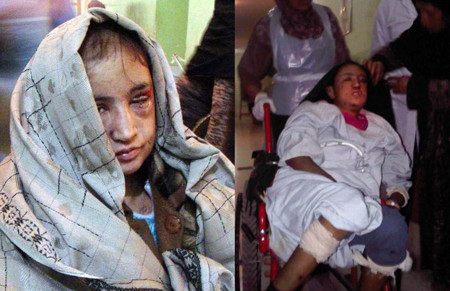By Undercover Rover
Sahar Gul was just 14 years old when she was married off to a man more than twice her age in the Bhaglan province of northern Afghanistan.
Upset by her refusal to become a prostitute, Sahar’s new family kept her in a windowless basement for months, torturing her by pulling out her nails and removing chunks of her flesh with pliers.
This happened last year. It is not an isolated incident.
Estorai was a 22-year-old young mother living in Kunduz province until early this year. She was pregnant with her second child when the threats began. Sher Mohammad, her husband, was unhappy their firstborn was a girl. Estorai’s husband made plain he would kill her if she gave him another daughter.
Estorai lived under this death sentence throughout her pregnancy, knowing her life depended on the sex of the child in her womb. Towards the end of last year Estorai gave birth to another baby girl. Within weeks she was dead, strangled. Estorai’s husband hasn’t been seen since.
In November last year, a group of Taliban supporters in Ghazni, southeastern Afghanistan, dragged a mother and daughter from their house and began stoning them. Someone had apparently reported the women for being engaged in “moral deviation and adultery.” Whether the women were taking too long to die or the men were concerned with getting caught is not clear, but at some point the murderers stopped stoning the women and shot them dead. The executions took place in Ghazni City, three hundred meters from the governor’s office. No one tried to intervene.

Sahar Gul, a 15-year old girl brutally tortured by her in-laws for refusing prostitution. (Photo: RFE/RL)
Then there’s the story of Gulnaz, jailed for 12 years for being raped—guilty of “adultery by force.” Gulnaz was released from prison after an international outcry, but her only real chance of survival now is to marry her rapist. If she doesn’t, she’ll be cast out by her family, and probably murdered for the “shame” she has brought upon them.
It’s a shocking litany, but according to this regularly updated list, there’s much, much more. It makes for difficult reading.
How do we square these stories with the official line coming from the Afghan government? The one that says the plight of women has greatly improved under the coalition-backed administration? It’s true, both constitutionally and practically, great strides have been made since the Taliban were bombed out of power in 2001.
Women, under the new Afghan constitution, are equal to men in the eyes of the law. They have the right to an education and they have the right to work.
But the reality on the ground is very different.
Ghazni City, where the unnamed mother and daughter were stoned and shot, is nominally controlled by Western forces. In reality, the Taliban runs 11 of Ghazni’s 18 districts, and here they are up to their old tricks: banning girls from school, banning mobile phones, radios and televisions, and (this is a new one to The Grit) stopping men and women from getting married together because it’s thought the bride makes too much noise walking to the wedding hall, disturbing the men.
The coalition’s willingness to negotiate with the Taliban as part of its withdrawal from Afghanistan sends a very depressing message to women. The headway that has been made over the last 10 years suddenly looks very fragile if the Taliban can get their hands back on the levers of power.
Hillary Clinton has publicly stated she is determined not to let any gains be reversed. The Secretary of State says she is working to ensure the U.S. withdrawal from Afghanistan does...
...nothing which sets back the rights and the security of women... I feel that it is part of my responsibility to do all that I can to ensure that whatever the United States is part of in trying to resolve this conflict, we do nothing that undermines the gains that have been made for women.
Yet in the same interview Clinton admits:
...life for many Afghan women is not that much different than it was a hundred years ago, 200 years ago.
Which somewhat undermines her point.
In some parts of Afghanistan, yes, there has been progress on women’s rights, but in reality Afghanistan remains the most dangerous country in the world to be a woman.
Despite Hillary Clinton’s pledges, no one has any illusions about the withdrawal of Western troops from Afghanistan and what it means for women. Only a fool would claim the situation is going to improve.
The best chance any of us have of stopping the abuse, rape and torture in Afghanistan is to support the organizations that are documenting it and campaigning against it.
Otherwise, stories like Sahar’s, Estorai’s, and Gulnaz’ will never get heard, and the daily hell which passes for life in Afghanistan will continue, for may women, indefinitely.



